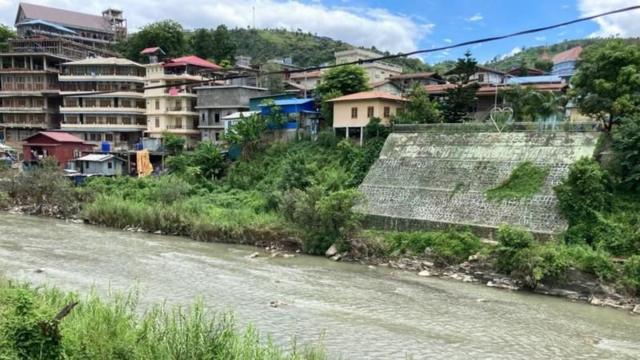People of the Jo tribe are holding protests against the central government’s decision to erect barbed wire fences on the border between Myanmar and India in various areas of India’s northeastern states of Mizoram, Manipur and Nagaland.
At the same time, the members of the Joe tribe have also protested against the removal of the rule that the residents of the border areas of Myanmar and India could travel up to 16 km without a passport-visa.
Zoro-Reunification Organization or Zoro says that the people of their tribe are scattered in India-Myanmar and Bangladesh, and various family members also live in different countries. Zoro demands that the Kuki-Chin-Mizo and Zomi peoples be brought under one administrative system.
They will be separated from their families if they are barbed wire fenced at the border or if the ‘Free Movement Regime’ or FMR to go to other countries without passport-visa is given away, they will be separated from their families, say Zoro leaders.
Hence, the Janjati groups are holding successive protests in many areas of Mizoram, Manipur’s Tenganupal district and Nagaland against the central government’s decision. Gatherings have also taken place at the border gates of Mizoram and Myanmar. There, people from across the Myanmar border had gathered to hear the speech.
At the end of the meeting, the people of the two countries can be seen shaking hands from inside the closed border gate.
Can arms be taken up?
In one such meeting organized by Joro, the organisation’s Secretary General L Ramdinliana Renthaley announced that if the central government does not reverse its decision to erect barbed wire fences on the Myanmar border and hand over the FMR, a situation may arise when the youth of Mizoram may move to clandestine deras and take up arms.
However, R Sangkawaya, president of the Zoro organization, told BBC Bangla, “Someone may be talking about going the armed route, but we have made a decision to be on the path of non-violence since our inception and there is no reason to deviate from that decision.
“Myanmar, India, Bangladesh, some in Tripura, where there are people from all ethnic groups, let’s talk about uniting them. There is no place for violence in this,” commented Zorro President R Sangkawaya.
Zoro also says that one of the foundations of their movement is Article 36(1) of the Constitution of India. According to that clause, the people of the nation have the right to observe religious, cultural, political, economic and social traditions beyond the borders. The Constitution has given responsibility to the states to ensure this right.

Why object to barbed wire fences?
Home Minister Amit Shah announced plans to fence the India-Myanmar border in January this year.
However, fencing work had already started on the border between Manipur and Myanmar.
Official sources in Manipur said that in the initial phase, 10 km border of Manipur will be fenced, then another 70 km border will be fenced.
The length of border with Myanmar is 398 km with Manipur, 520 km with Arunachal Pradesh, 215 km with Nagaland-Myanmar border and 510 km with Mizoram.
As the Kuki-Chin-Mizo-Jo people are protesting after the central government’s announcement, the powerful Yang Mizo Association of Mizoram is also angry with the government’s decision.
President of the organization Lalmachuana told BBC Bangla, “Our relatives are spread across India, Myanmar and Bangladesh. We were not consulted when the three countries became independent. So the family stayed where they were.
“But it is forbidden to visit relatives, how can it be accepted? Question Mr. Lalmachuana
Zoro president R Sangkawaya said that they were directly organizing the protests in Mizoram, while the protests in Manipur and Nagaland were being organized by the fraternal organizations there. There have been several meetings between them. A consensus has also been reached about organizing a big rally collectively.
Barbed wire decision after violence in Manipur
After violence broke out in Manipur last year, both the central and state governments have repeatedly indicated that miscreants from Myanmar are supplying arms to tribal groups.
On the other hand, thousands of people have fled to Mizoram since the start of an armed campaign by guerrillas against the military junta in Myanmar.
According to the latest data, 34,141 Myanmar residents have now taken refuge in Mizoram.
The government said the barbed wire fence was decided to prevent infiltration from the border.
Again, the rule of unrestricted movement of residents of border areas between Myanmar and India has also been suspended.
As a result, there are fears among many that the various measures taken to control the situation in Manipur are likely to create anger among the residents of other North Eastern states. The protest of the people of Jo Janja may be an indication of that.